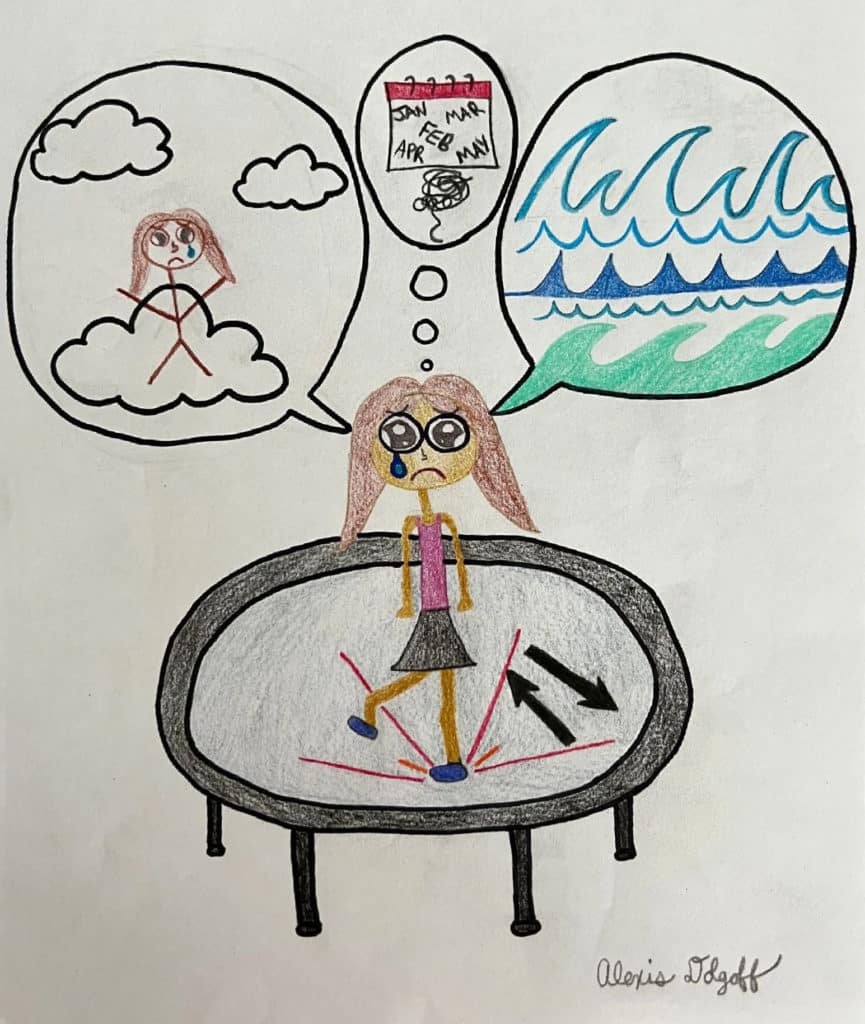I call this “Floating Away,” as I am constantly feeling that I am floating or bobbing in water, or floating on clouds. I have had MdDS three separate times, with my current episode occurring right now. I am on the 6th month of this episode.

I am a Doctor of Physical Therapy and I have been writing a medical book to go into details of all vestibular disorders but especially MdDS and my entire experience with it. The whole truth of it. My hope is to not only increase the recognition of MdDS but to also bring knowledge, comfort and strength to those suffering with MdDS.
I am grateful for this opportunity to be creative and express what I feel on paper, since putting it into words is sometimes so incredibly difficult. ~Alexis Dolgoff, DPT
While primarily diagnosed by an otolaryngologist or neurologist, you can get a diagnosis from a Physical Therapist, Family Doctor, or any health care professional that is familiar with MdDS. The diagnostic criteria published in the Journal of Vestibular Research is a valuable reference that helps differentiate MdDS from BPPV, Vestibular Migraine and other similar disorders.
This is my 4th episode of MdMS. The first one resolved in a week, the second in a month and the third took close to a year, but it did clear up. Unfortunately I didn’t understand what I was experiencing until we cruised again in 2017. It has never gone away and only gotten more intense. I am disappointed that the medical community continues to insist that the cause is related to the vestibular system. If that was the only cause it would not be limited to such a narrow group of middle age women.
Nor do I believe it’s hormones. Women my age have much in common, including physical changes in how we move. My condition gets more extreme as my scoliosis worsens. In addition I have a neurogenic bladder and bowel. Many women my age suffer from similar ailments due to childbirth. We suffer from irregular gaits due to foot and hip problems from wearing the wrong shoes in our younger years.
I believe that our bodies learn to compensate for many of these irregularities and when we get into a situation on a cruise or during extended flights and travel, these physical compensations get exaggerated in our brains. Much like chronic pain syndrome. Or even missing limb syndrome.
While I may be spitting in the wind with some of my theories, I think it’s time for the medical community to look at other possibilities by asking people about more than just their MdDS symptoms. After all it took a long time for doctors to believe that stomach ulcers couldn’t be cured by diet alone.
The cause of MdDS is not known. The medical community works with MdDS as a vestibular disorder because that is what evidence-based research supports. You may be interested in the research articles, “Metabolic and functional connectivity changes in mal de debarquement syndrome” published in the journal PloS ONE, and “Neuroimaging Markers of Mal de Débarquement Syndrome” published in Frontiers in Neurology, among others. Peer-reviewed biomedical literature on MdDS can be found here: https://staging.mddsfoundation.org/biomedical-literature/
MdDS is not limited to middle-aged women. We know of cases where patients were diagnosed at under 10 years of age and others in their 60s and above, both men and women. As a member of MdDS Friends, our online support group, you can interact with those who are age 13 and over.
It is common for clinicians to take a medical history before diagnosing MdDS. Your clinical history sounds complex, so it’s natural to theorize. The way to move beyond theory and speculation, and to expand upon what we do know, is to raise awareness and interest in research, as well as funds to support clinical studies. We invite all who can help with our Mission goals to volunteer, and write to us at connect@mddsfoundation.org with details on how you can help.
If there is no cure for MdDS, how could one have it “three” times?
There is no cure yet. More research is needed. To answer your question: For some, the disorder is self-limiting, resolving on it’s own. Unfortunately, MdDS is episodic for many. Generally, each recurrence lasts longer than the previous episode.
It will usually resolve on its own the first time or two. Had I known what I was experiencing and that by continuing to cruise I was taking a chance of having a chronic condition, I would have stopped when it cleared up after the 3rd time.
Experiencing the sensation of feeling like you’re sill on the ship after a cruise is quite common, and usually transient. It is also true that the phantom sensation resolves on its own for most. However, there are no evidence-based statistics to support a statement that MdDS, the disorder as a syndrome, will usually resolve on its own the first time or two. More research is needed. If you aren’t already a member, please consider joining MdDS Friends, our online support group. As a member of, you will find others like yourself who went on multiple cruises before experiencing chronic MdDS.
Why is a diagnosis necessary?
What tests are used for a diagnosis?
A diagnosis is helpful for those applying for Disability but otherwise isn’t necessary. An official diagnosis is also validating and helps many starts taking forward steps in their health journey. As for tests, none are needed and, indeed, none exist that can provide an MdDS diagnosis. Most doctors order tests to exclude other conditions, which is why most test show “normal” results.
Hi Alexis,
I would be happy and excited to share some information on my experience and self management of mdds which you may find interesting?
I don’t really do Facebook so here’s my email address [redacted].
Kind Regards,
Marie